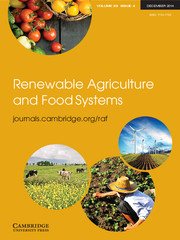Article contents
Global benefits, local burdens? The paradox of governing biofuels production in Kansas and Iowa
Published online by Cambridge University Press: 30 March 2010
Abstract
Recent sociological analysis of the expansion of the biofuels industry internationally has noted the paradox between the purported global environmental benefits of reducing greenhouse gas emissions by replacing fossil fuels with biofuels, and the potential for distinctly negative environmental impacts experienced at local sites of biofuels production. The state, in both the USA and the EU, has played a prominent role in promoting the development and expansion of biofuels production through government mandates and incentives, but the state's role in governing the potentially (negative) economic, social or environmental impacts of biofuels production on local communities has been much more limited in scope. We review the environmental sociological literature to frame analysis of how the state is governing the benefits and burdens brought by the ethanol industry to rural communities in Kansas and Iowa. Drawing on data from community surveys, focus group and individual interviews and analysis of environmental violations, the paper examines the local impacts of biofuels production in three case-study communities. Findings suggest that local residents do not express many concerns about environmental impacts and that the state has played a modest role in governing the negative local environmental impacts. We argue that this lack of concern is related to the histories of these rural communities, which have long depended on resource extractive industries and currently are desperate for economic growth. We find that criticisms of negative environmental impacts are muted in relation to purported economic benefits and to other comparable industries. These community case studies illustrate some of the challenges, both at the practical and theoretical levels, of governing biofuels production.
- Type
- Research Papers
- Information
- Renewable Agriculture and Food Systems , Volume 25 , Special Issue 2: “Sustainable Agriculture Systems in a Resource Limited Future” , June 2010 , pp. 129 - 142
- Copyright
- Copyright © Cambridge University Press 2010
References
- 19
- Cited by




